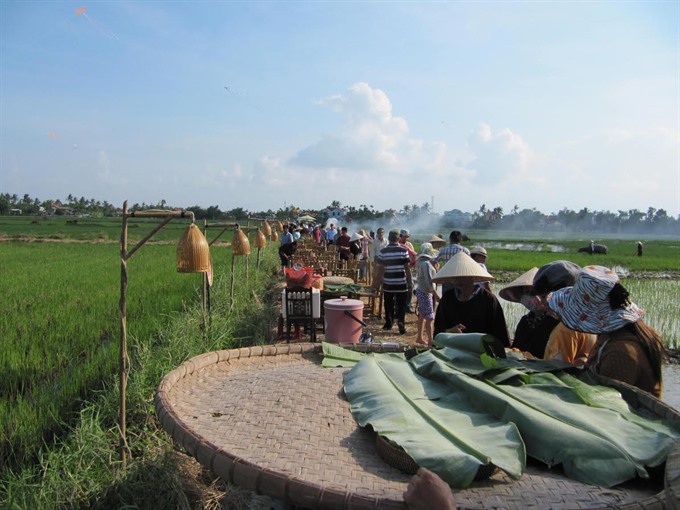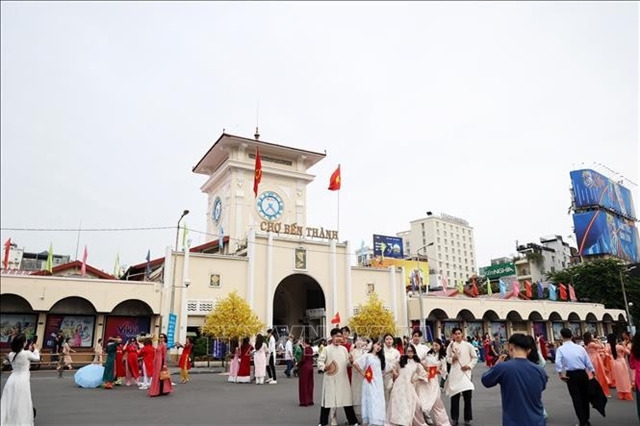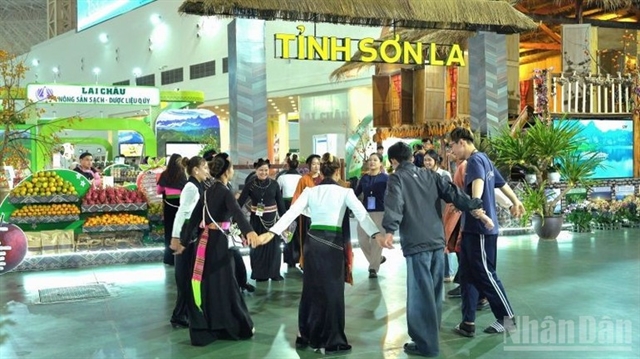

Women from villages in Quảng Nam Province have started a very successful business.
They provide food for people to eat at functions.
 |
| Rural falvours: Residents of Điện Bàn Town cook their farm produce at a harvest festival. Fish, potatoes, maize are cooked on straw or firewood stoves. VNS Photo Công Thành |
Women from villages in Quảng Nam Province have started a very successful business.
They provide food for people to eat at functions.
The women wake up early to start work and end late.
Four women started doing this sort of work some time ago and now many others are also involved in the business.
By Thiên Thanh
On weekends, long before the onset of dawn, things start buzzing in Châu Lâu Hamlet.
In fact, it gets busier – and noisier – than a beehive. Courtyards echo with the sounds of people calling out various things from the kitchen. Then there’s the thump of big knives pounding on big chopping boards, the clanging of pans, the sound of water running…
But the strongest evidence of a feast, or several feasts, in the making is the aroma of shrimps being stir fried that float into the small streets. And along these winding streets, mini-vans soon get loaded with food trays.
“We can only have a simple meal of vegetables, either boiled or stir-fried, with rice to keep us going,” said Trần Thị Thu Hà, a local catering business owner.
“My favourite food is boiled vegetables with pickled cucumber dipped in anchovy paste,” she said, adding, “I cook and smell the food too much. Now I don’t like meat or seafood. I only crave vegetables.”
Hà sometimes takes as many as 10 catering orders a day. “Now we need to get food ready, when the minivans are back, the food must be ready to go, too. We cater to parties in Đà Nẵng City and we must get there on time.
“During the weekends and on festive days, our days start at 2am and run till 5pm.”
Hà says she has 10 close employees and when orders come rushing in, she has to hire up to 40 or even 50 people.
“The biggest party I’ve served is 200 tables,” she said, meaning serving a wedding feast for 2,000 people. And these are seven-course meals!
Hà has been in this business for six to seven years. She’s gotten so busy she can’t take time off.
As soon as Hà and the women sip some tea to complete their meal, they head out to work. There’s plenty to do: picking and cleaning vegetables, chopping meat and ribs, slaughtering chicken.
Hà is soon glued to her mobile phone, taking or checking orders. Her iPad is full of food presentation photos. She is constantly looking to improve her service.
Hands on
We went to neighbouring La Trung Hamlet, which is also in a high bee-hive mode. Seeing off a line of motorbikes catering to smaller parties, Nguyễn Thị Ngọc Ánh returned to her huge kitchen, now empty because everything had gone.
She has been overworked. Her sleep-deprived eyes check out chickens being boiled in whole in a big pot. “Today we cater to eight parties. The closest one is a wedding in the neighbouring village. Thirty-five tables of ten.”
A mâm, or table, is a full seven-course meal with starters like salads, main courses, soups and vegetables, and desserts, for 10 people.
“Everyone has gone to the parties. I was here before the rooster began to crow. And I will be here until the last dishes of food is out at 4pm,” Ánh said. Next to where she’s standing is a booking calendar that shows 12 catering orders for the day.
Though she has people helping in the kitchen, Ánh maintains her job of marinating and being the principal chef in her kitchen.
“I get orders for the good food that I make with my own hands. I can’t make an excuse that I’ve got too many orders and pass the job to someone else. That’s not good. I want to keep my good reputation.
“Each day, I only accept orders for a little more than 1,000 people to ensure my good quality.”
When the orders rush in, not only are the chefs overworked, other villagers get their share of work, too. Nguyễn Thị Tuyết, who helps out every time a kitchen calls, said: “Sometimes three or four people call in one day, so I have to serve the one who called first. There’s so much work to do. The only concern is if you can manage it.”
Military precision
In this business, the chef who directs her kitchen also needs to work in sync with what’s happening in the wedding hall.
When the master of ceremonies begins proceedings in the big hall, Lê Thị Mai of La Trung Hamlet, de facto chef in the kitchen, snaps out her order: “Start!” It is only then that the food will be taken to the plate.
Everything has to be very well organised so that the food trays are taken to the dining room in order.
“Hot dishes must be warmed up and served right then,” Mai said.
As the MC said “Thank you”, Mai called out: “Ready! Dishes, go!” Her team of 10 waiters, all decked out in smart uniforms, held the dishes up to their shoulders, and walked in harmony with the music, gently placing the trays on the tables.
“In the past, we used to get all the food ready on the table,” Mai said.
“But just seeing too much food at one time, people felt full and did not find it delicious.”
“People need time to taste the food, so each course is served in an order. We wait for at least 10 minutes after the starter to serve the main course. We serve the fried dishes with accompanying soups. And we serve fruit for dessert,” she said.
Ánh, who still keeps the actual cooking job to herself, said: “Catering to parties is like getting married to a big family. You can’t say no to clients who come to you, but do not have so much to spend.”
The norm in the village has been to charge between VNĐ70,000 to 100,000 per person.
“If the client cannot afford higher rates, then we try our best to serve them at between VNĐ70,000 and VNĐ80,000 per person.
“We have to treat each and every client of ours the same way. Even if they cannot pay more, we still show them that we care so that they are impressed and satisfied. Only then can we survive in our business,” Ánh said.
Fabulous Four
Until a decade or so ago, whenever food for wedding parties, birthdays and death anniversaries was talked about, everyone turned to the Fabulous Four: Tằm, Dung, Hoa and Nữ. These women are seen as the “founding goddesses” of the catering service in the village.
Then, all the women in the village followed the Fabulous Four to help with cooking and serving for big parties. They didn’t mind being called to only clean vegetables or peel garlic, or wash dishes.
Some of the women learnt the work and started to cook and cater for their family parties. And when guests began appreciating the food and service, the women started accepting bigger orders.
Ngọc Ánh of La Trung is one of them.
“I helped out for a few years. Then I thought, ‘Oh, I can make all the dishes, why not try on my own?’ she said.
“The first party I cooked for was for my cousin,” Ánh recalled.
“Guests coming here from Đà Nẵng praised me to the sky. Then they asked me to come to Đà Nẵng and cook. That was it.”
Ánh said she printed name cards to give out at parties, and now she has more orders from Đà Nẵng than from neighbouring villages.
“At first, I only wanted to do weddings. Now, I take any order:house-warming, birthday, special events and death anniversaries.”
Win win
In the catering hamlets, some women have signed up for food safety classes or cooking classes, and have begun surfing the Internet to learn new dishes and expand their menus.
According to Võ Thị Tình, chairwoman of the Điện Thọ Commune Women’s Union, there are 200 catering households in the commune, mostly in the Đông Hòa, La Trung and Châu Lâu hamlets.
To encourage the catering trend, the local Women’s Union chapter proposed that the Quảng Nam Department of Labour, War Invalids and Social Affairs opens cooking and food safety classes.
“We have given out 100 cooking certificates (since 2013),” Tình said. This has created more income-earning opportunities for the women of the district.
Almost all women have left farm work to their husbands and children, and gotten involved in the catering business.
“Everyday if I help out in the kitchen, I get paid VNĐ200,000 ($9),” said Nguyễn Thị Xí, a long-time farmer from Đông Hòa. If I work hard and come early to work in placing tables, I get VNĐ350,000 ($15). Those who can cook get paid more than VNĐ400,000 ($18) a day. Every month, we work for 20 days and we get bonuses too.”
The catering trend has turned a new page for the villagers of Điện Thọ. The business owners have minivans and new villas. The supporting services have spread the prosperity. Those who can’t cook supply fresh food and seafood, they rent out tables and make-shift wedding halls or music equipment.
In Điện Thọ, it’s hard to find a rundown looking old house. They are all new and clean. —VNS
GLOSSARY
Courtyards echo with the sounds of people calling out various things from the kitchen.
When you make a sound and you hear that sound coming back to you because the sound waves have bounced off something like a wall, or a mountain, what has happened is called an echo. In this sentence “echo” is used as a verb.
But the strongest evidence of a feast, or several feasts, in the making is the aroma of shrimps being stir fried that float into the small streets.
Evidence means proof.
An aroma is a pleasant smell that often comes from food.
“My favourite food is boiled vegetables with pickled cucumber dipped in anchovy paste,” she said, adding, “I cook and smell the food too much.”
When things like cucumber are pickled, they are stored in substances such as vinegar and brine to last a long time and get a savoury flavour.
Hà sometimes takes as many as 10 catering orders a day.
Catering means providing people with food and drink at a special gathering.
Hà says she has 10 close employees and when orders come rushing in, she has to hire up to 40 or even 50 people.
Employees are people who work for someone else.
There’s plenty to do: picking and cleaning vegetables, chopping meat and ribs, slaughtering chicken.
Slaughtering means killing.
Her sleep-deprived eyes check out chickens being boiled in whole in a big pot.
To be sleep-deprived means to have gone without any sleep.
A mâm, or table, is a full seven-course meal with starters like salads, main courses, soups and vegetables, and desserts, for 10 people.
Desserts are sweet courses in a meal. They are also called puddings.
“I was here before the rooster began to crow.”
A rooster is an adult male chicken.
Though she has people helping in the kitchen, Ánh maintains her job of marinating and being the principal chef in her kitchen.
Maintains means “keeps going”.
Marinating means soaking food in a marinade, which is a mixture of oil, wine, spices, or similar ingredients, to flavour or soften it.
I want to keep my good reputation.
Your reputation is your standing in society based on what people think of you.
In this business, the chef who directs her kitchen also needs to work in sync with what’s happening in the wedding hall.
In sync means working well together. In this case it is between the chef and the people in the wedding hall.
When the master of ceremonies begins proceedings in the big hall, Lê Thị Mai of La Trung Hamlet, de facto chef in the kitchen, snaps out her order: “Start!” It is only then that the food will be taken to the plate.
A master of ceremonies is a person who is in charge of speakers at a function or a ceremony.
Her team of 10 waiters, all decked out in smart uniforms, held the dishes up to their shoulders, and walked in harmony with the music, gently placing the trays on the tables.
Walking in harmony with the music means walking in time with it.
The norm in the village has been to charge between VNĐ70,000 to 100,000 per person.
The norm means “what is normal”.
Until a decade or so ago, whenever food for wedding parties, birthdays and death anniversaries was talked about, everyone turned to the Fabulous Four: Tằm, Dung, Hoa and Nữ.
A decade is a period of ten years.
These women are seen as the “founding goddesses” of the catering service in the village.
Founders are people who start something. In this case they are called “founding goddesses” because they are admired for having started the catering service.
“At first, I only wanted to do weddings. Now, I take any order: house-warming, birthday, special events and death anniversaries.”
A house-warming is a party to celebrate moving into a new home.
To encourage the catering trend, the local Women’s Union chapter proposed that the Quảng Nam Department of Labour, War Invalids and Social Affairs opens cooking and food safety classes.
Invalids are people who are weak or ill after having suffered an injury or an illness.
The supporting services have spread the prosperity.
Prosperity means “doing well”.
WORKSHEET
State whether the following sentences are true, or false:
© Duncan Guy/Learn the News/ Viet Nam News 2017
1. False; 2. True; 3. True; 4. True; 5. False.




